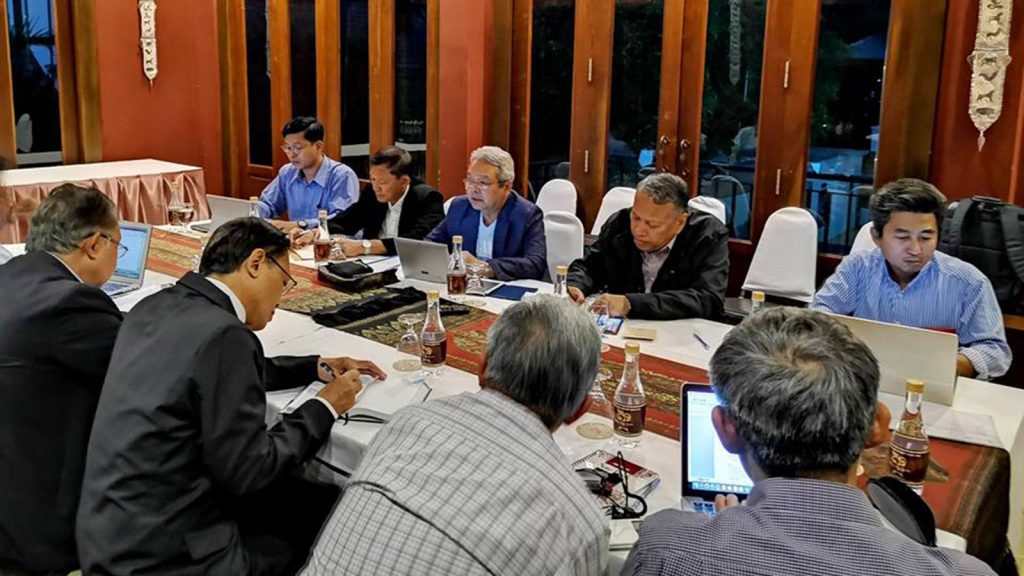11 March
A government delegation led by U Khin Zaw Oo, Secretary of the Peace Commission, met informally with ethnic armed organizations (EAOs) in Chiang Mai, Thailand, over the course of three days last week to negotiate resuming their participation in formal dialogues with the government and Tatmadaw for Myanmar’s peace process.
Accompanying U Khin Zaw Oo were PC member U Aung Soe, Director-General U Zaw Htay of the Ministry of the Office of the State Counsellor, member of the UPDJC Secretariat U Hla Maung Shwe, and U Kyaw Linn Oo as technical support.
The government delegation met with the Vice Chairman and secretary of the Karen National Union (KNU) delegation on 8 March, with the Peace Process Steering Team (PPST) on 9 March, and with Karenni National Progressive Party (KNPP) on 10 March.
The KNU have signed the Nationwide Ceasefire Agreement (NCA) and the PPST represents ten ethnic armed organization signatories, while the KNPP have yet to sign the NCA.
The following is an interview with U Hla Maung Shwe, a member of the Union Peace Dialogue Joint Committee Secretariat, on the progress made during the various meetings.
Q: What was the main factor behind these meetings?
A: The KNU had temporarily suspended its participation in all ongoing peace negotiations. These informal meetings intend to find a solution to that.
Likewise, the RCSS (Restoration Council of Shan State) have also suspended discussions with the Joint Monitoring Committee (JMC) temporarily. This has inconvenienced the ten NCA signatories to continue peace talks and come back to the dialogue table.
This is why we came at a time when the PPST would be meeting together and the KNU would be present. We also decided to meet with the non-signatory KNPP while we were there.
The meetings were informal but they are just as important. We saw there was much more needed to be done. The nature of informal talks is that no decisions are made from them but they also allow us to hold open and unreserved discussions with each other. We get opportunities to build trust between us and explain on things not clear to one another. I believe we were able to take those steps in these informal meetings.
Q: Could you describe your meeting with the KNU?
A: The KNU delegation explained their understanding and approach to us and we explained about this too. Their main concern was that the political dialogues might become one-sided. They expressed their wish to proceed on the path outlined in the NCA. We told them the NCA is more than just us or the KNU and is bigger than the ten signatories, the government or the Tatmadaw. If we are to follow the NCA process then there must be Union Peace Conferences, the UPDJC, and the JMC. Only then can we negotiate with each other and find solutions.
Since the discussions had been postponed there are 16 representatives from 24 political parties that won elections. They are waiting as well. The UPDJC can’t discuss their worries and guarantees because of this.
We explained to them that we can include the discussions from the UPDJC in the conference which can then be passed on to the Hluttaw for approval. Both sides were able to have open discussions as we intend to hold all final discussions within 2019 and to resume political dialogue. This is why the KNU will be able to hold meetings with the National Reconciliation and Peace Center (NRPC) and as well as the Tatmadaw soon. We believe the formal talks will commence after their meetings.
Q: How did the meeting with the PPST go?
A: They will hold an EAO Summit with top leaders in May. This is a preliminary meeting to make changes with the UPDJC, the JMC and other necessary steps before the summit. We explained that the UPDJC could be held as informal meetings and we think they largely understood our explanations. We hope to hold informal meetings with them to make necessary changes either in Yangon or Nay Pyi Taw.
Q: And how did the meeting with KNPP progress?
A: The KNPP didn’t say they were opposed to signing the NCA nor did they suggest paths outside the NCA process so we were not unfamiliar with each other. We openly discussed some difficulties at the grassroot level and inviting them to meet with the NRPC in Nay Pyi Taw after they hold their own meetings. I understood that they are in favour of holding meetings with the Tatmadaw so I believe they will provide results soon.
Q: Thank you for your time and one last question. Could you tell us the government’s current tasks to the peace process?
A: The RCSS will be meeting with NRPC in Nay Pyi Taw on 11 March (today) and they will meet with the Tatmadaw shortly after that. The Peace Commission is continuing talks with EAOs in Northern Myanmar to sign the NCA. We are working on arranging meetings with them.
By Ye Khaung Nyunt
(Translated by Zaw Htet Oo)


